Imagine a world where the government held absolute power, where your voice was silenced, and your rights were trampled upon. This chilling vision of tyranny fueled the Founding Fathers of America, who sought to create a system of governance that protected individual liberties and prevented the rise of an oppressive regime. The document they crafted, the U.S. Constitution, stands as a testament to their wisdom and a cornerstone of American democracy. But how, exactly, did the Constitution guard against tyranny? This essay delves into the heart of this question, examining the crucial components that safeguard our freedoms and ensure a government “of the people, by the people, for the people.”

Image: www.coursehero.com
The Constitution, with its carefully designed framework, operates as a bulwark against tyranny in several key ways. It establishes a system of checks and balances, fostering a complex and dynamic relationship between the different branches of government, ensuring no single branch amasses absolute authority. This separation of powers prevents any single entity from wielding unchecked power, fostering a system of checks and balances that guarantees fair and equitable governance.
The Separation of Powers: A Symphony of Checks and Balances
The Constitution’s most fundamental safeguard against tyranny lies in its division of governmental authority into three distinct branches: the legislative, executive, and judicial. Each branch possesses unique powers and responsibilities, and each acts as a check upon the other, preventing any single branch from dictating the course of the nation.
The legislative branch, Congress, holds the power to make laws. The executive branch, with the President at its head, enforces these laws. The judicial branch, embodied by the Supreme Court and lower federal courts, interprets the laws. These powers are meticulously outlined in the Constitution, ensuring that the government operates within a defined framework. But the real genius lies in the interplay between these branches.
Congress, with its power to make laws, can pass statutes that challenge the executive branch, potentially limiting the President’s authority. The President, on the other hand, possesses the right to veto legislation passed by Congress, preventing undesirable laws from becoming enacted. If the President vetoes a bill, Congress can override it with a supermajority vote. This intricate dance of checks and balances ensures that all three branches engage in a constant dialogue, constantly scrutinizing each other’s actions and preserving the delicate balance of power.
The Bill of Rights: A Bastion of Individual Liberties
The Constitution’s framework is further fortified by the Bill of Rights, a collection of ten amendments that explicitly guarantee fundamental rights and freedoms. These amendments stand as a powerful statement against tyranny, safeguarding individual liberties against potential government encroachment.
The First Amendment, often hailed as the cornerstone of American democracy, guarantees freedom of speech, religion, the press, assembly, and the right to petition the government for redress of grievances. These freedoms allow citizens to express their opinions, engage in peaceful dissent, and hold their government accountable, ensuring that no single ideology reigns supreme.
The Second Amendment, a subject of much debate in modern times, enshrines the right to bear arms. The Founding Fathers, in a nation still grappling with the memory of British tyranny and a fledgling army, believed that an armed populace served as a vital check against government overreach. This right, while contentious, underlines the Constitution’s commitment to arming citizens to resist potentially oppressive regimes.
The Fourth Amendment protects individuals from unreasonable searches and seizures, reinforcing the principle of individual privacy and safeguarding citizens against arbitrary government intrusion. The Fifth Amendment guarantees due process of law, ensuring that individuals accused of crimes are afforded fair trials, are protected from self-incrimination, and are not subjected to double jeopardy. The Sixth Amendment codifies the right to a speedy and public trial, ensuring that individuals facing legal charges are not subjected to indefinite detention or prolonged legal battles.
These fundamental liberties, enshrined in the Bill of Rights, stand as a powerful testament to the Constitution’s commitment to protecting individuals against the insidious clutches of tyranny. They serve as a beacon of hope, reminding us that we are not mere subjects, but individuals with inherent rights that transcend the whims of the powerful.
Federalism: A Symphony of Shared Power
The Constitution also adopts the principle of federalism, dividing power between the national government and the individual states. This division of authority ensures that the federal government does not become overly centralized, and it empowers states to address their unique needs and concerns.
Each state possesses its own constitution and elected officials, allowing for diverse policies and governance styles. This decentralized approach fosters innovation and experimentation, while also protecting individual liberties. Federalism ensures that citizens have multiple levels of representation and governance, promoting a sense of civic engagement and empowering local voices to shape their communities.

Image: graduateway.com
Limited Government: A Restraint on Power
The very structure of the Constitution underscores the principle of limited government. It outlines specific powers granted to the federal government, explicitly stating that any powers not enumerated belong to the states or the people. This principle of enumerated powers acts as a powerful check against tyranny, preventing the government from exceeding its designated authority and encroaching upon individual freedoms.
The Power of the People: A Vigilant Watchdog
The Constitution, through its commitment to democratic principles, ensures that the ultimate power rests with the people. Elections are held regularly, allowing citizens to choose their leaders and hold them accountable. The right to free speech and free press empowers citizens to criticize their government, raise concerns, and advocate for change. This constant interplay between government and its citizens is crucial in preventing tyranny.
Beyond the Text: The Legacy of the Constitution
The Constitution is not a static document, but a living testament to the ideals of freedom and self-governance. It has evolved and adapted over time, as the nation grappled with new challenges and fought to expand the promise of liberty to all its citizens. The amendments, from the abolition of slavery to the extension of voting rights, stand as a testament to the enduring spirit of the Constitution and its ability to adapt to the changing needs of society.
Navigating Challenges: The Ongoing Battle Against Tyranny
Despite the Constitution’s safeguards, the fight against tyranny continues to this day. The ever-evolving landscape of technology, the rise of misinformation, and the proliferation of partisan agendas present new challenges to the principles enshrined in the Constitution. It’s a constant battle, requiring vigilance, civic engagement, and a commitment to the fundamental principles of freedom, equality, and justice.
The Importance of Education and Civic Engagement
Educating ourselves on the Constitution, understanding its complexities and its historical context, is crucial. We must be aware of our rights and responsibilities as citizens, actively engaging in civic discourse, and holding our elected officials accountable. This ongoing dialogue and engagement are vital for safeguarding the ideals that the Constitution embodies.
How Did The Constitution Guard Against Tyranny Dbq
Conclusion: A Legacy of Freedom
The Constitution, with its carefully crafted framework and its commitment to individual liberties, stands as a testament to the enduring human desire for freedom and self-governance. It is a document that has shaped the course of history, guiding a nation toward a brighter future. As we navigate the challenges of the 21st century, let us embrace the principles of the Constitution, ensuring that the fight against tyranny continues and the ideals of freedom remain a beacon of hope for future generations.






